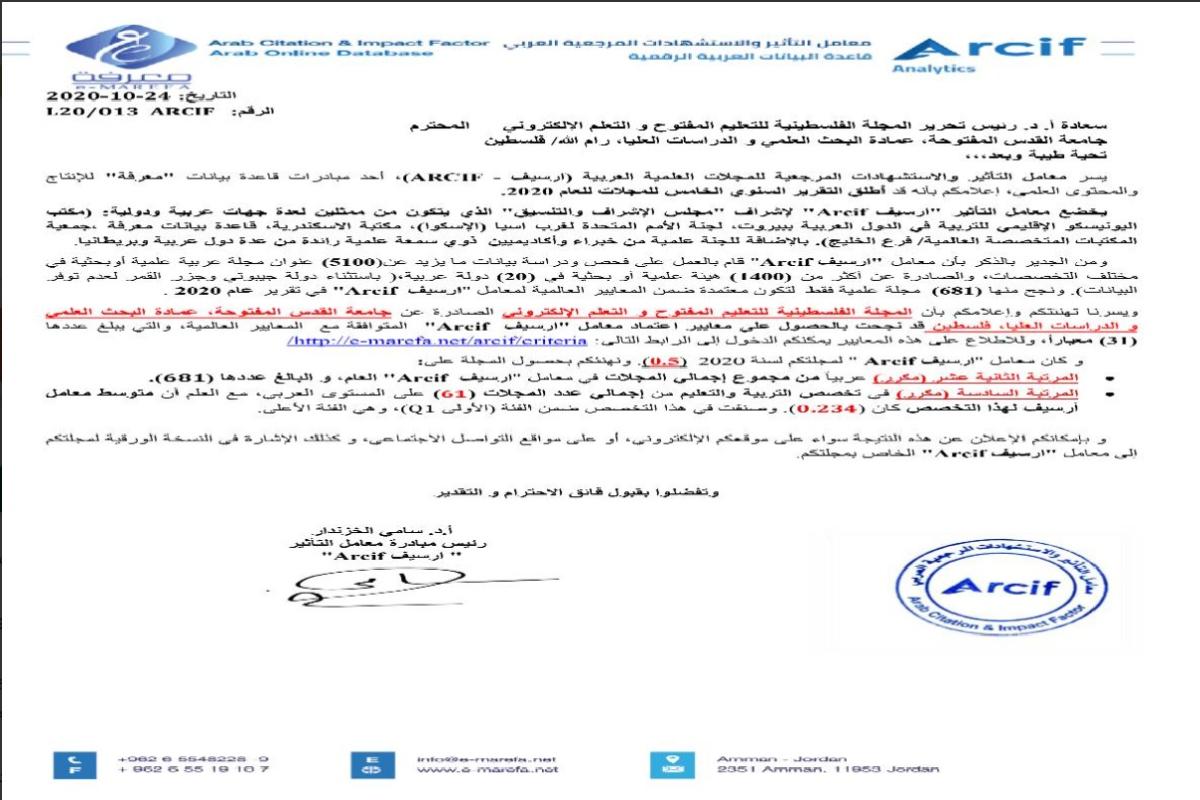
QOU’s journals obtained the Arab Citation and the Impact factor for the year 2020, as the evaluation results revealed that the University journals occupied high ranks on the national and Arab levels.
In the same context, the Journal of al-Quds Open University for Administrative & Economic Research & Studies, in the ARCIF evaluation, ranked third in business administration out of 37 journals, sixth in economics out of 78 journals, and seventh in financial economic and business administration sciences out of 116 journals at the Arab world level. The same journal ranked 23rd out of 681 journals on the Arab level. The journal was classified Q1, which is the highest rank.
The Palestinian Journal for Open Learning & e-Learning ranked fourth on the Arab level in the immediate citation index and sixth (repeated) in the education field out of 61 journals on the Arab level. The same journal ranked twelves (repeated) on the Arab level of the total journals in ARCIF in 2020 out of 681 journals. The journal was classified Q1, which is the highest rank.
ARCIF examined data from more than 5100 titles of Arab scientific or research journals in various disciplines, issued by more than 1400 scientific or research editorials in 20 Arab countries. Only 681 scientific journals have met the evaluation criteria, including the journals of al-Quds Open University, to be accredited within the international standards of “ARCIF” in the 2020 report.
The University’s journals occupied advanced positions at the Arab and local levels vis-a-vie the Arab Impact Factor. The impact factor of the University’s Journal of Administrative and Economic Research reached 1.7. The impact factor for the University’s Journal of Research and Educational and Psychological Studies reached 0.81, and the impact factor for the University’s Journal of Research reached 0.81. In comparison, the Journal of al-Quds Open University for Humanities and Social Studies reached 1.55. The Palestinian Journal of Open Education and e-learning, which is the only journal specialized in open education and e-learning in the Arab region, obtained an impact factor of 2.03, significantly higher than the impact factor it obtained in 2019.
The University president, Prof. Younes Amr, praised this achievement, stressing that it is paramount for scientific research at the University level in particular and Palestine in general. He added that it is consistent with the University’s vision and mission, which is based on leadership, excellence, and creativity in the fields of open and e-learning, community service, and scientific research.
On the other hand, Prof. Husni Awad pointed out that the journals of Educational and Psychological Sciences, and Open Education and e-Learning were previously chosen from among 100 peer-reviewed Arab journals by the Arab Impact Factor and the Association of Arab Universities to join the Arab Periodicals Platform (Digital Commons) to manage and publish scientific journals in both Arabic and English, and apply international scientific publishing standards on them. This step comes as part of an agreement signed by the Association of Universities with the international company “Elsevier” that owns the database “Scopus”, thus paving the way for this notorious database. Last month, the University’s journals officially joined the Arab Citation Index as part of a project sponsored by the Arab Republic of Egypt, a new database on Web of Science, a project implemented by Clarivate Analytics (previously Thomson Reuters). The University adopts the Digital Object Identifier (DOI) system, which is a digital identification code to preserve intellectual property rights. This system is used by all to obtain information about the place of publication and has quick access to research, which is a requirement for joining global databases such as Scopus and ISI.
Al-Quds Open University uses an open-source system (OJS) for its scientific journals, developed by the Information and Communication Technology Center (ICTC). The developed system made it possible to electronically manage scientific journals in all their stages and link them to the Arab and international databases.
Prof. Awad noted that the University, under the directions of Prof. Younes Amr, the general supervisor of the University’s journals, has maintained, as usual, the continuation of the procedures related to the issuance of the journals’ volumes during the closure of universities because of Covid 19 pandemic. The staff of the Deanship of Graduate Studies and Scientific Research and editorial boards carried out all the tasks from their homes.
Each of the University’s journals has an editorial and advisory board comprising competent faculty members with specialization in various scientific fields from inside and outside Palestine. The editors-in-chief hold periodic meetings, which contributed to the development of the journals in obtaining advanced ranks.